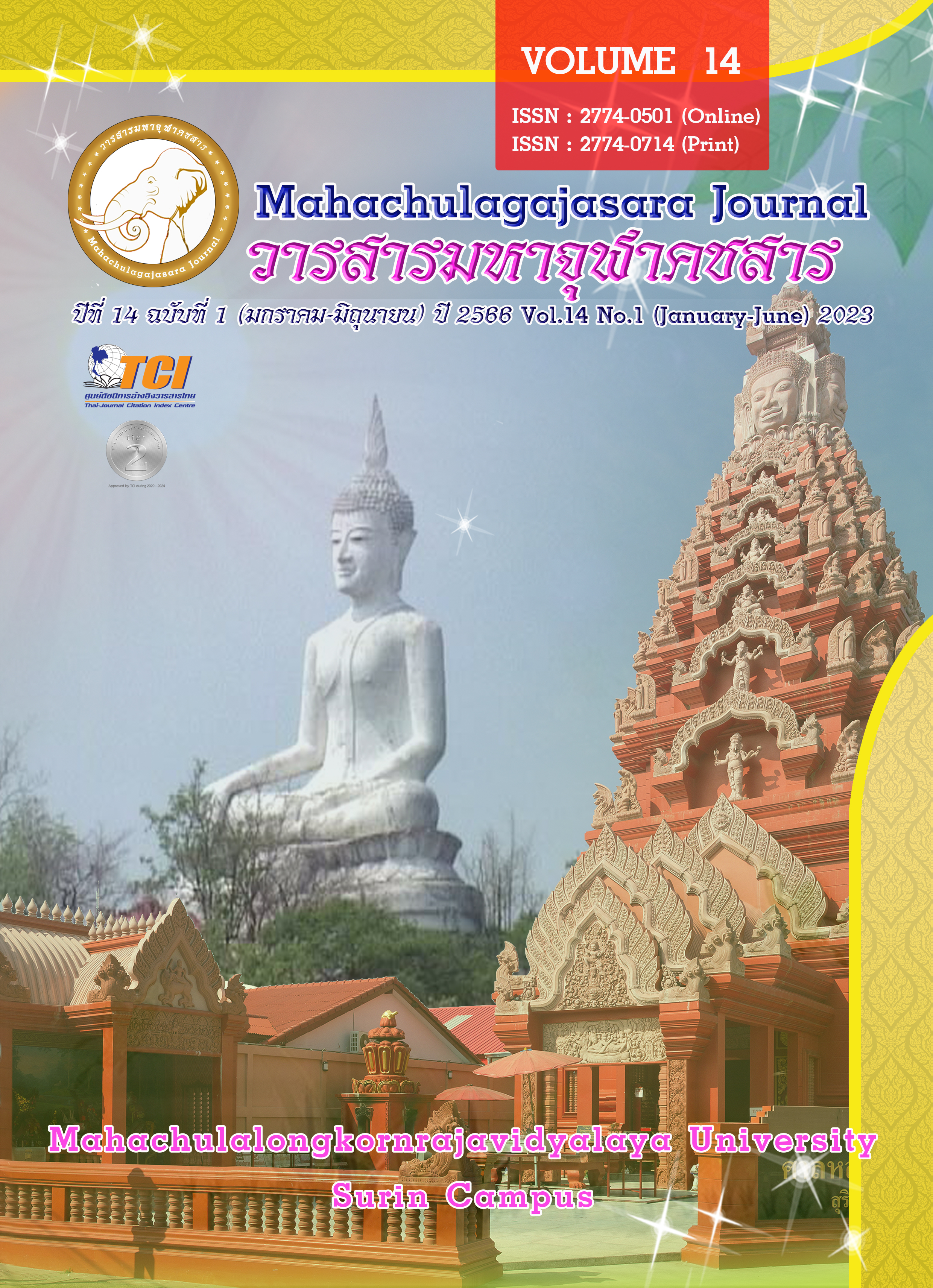The Relationship of Grade 6 Students’ Motivation and Self-Efficacy for Learning Chinese as a Foreign Language With Chinese Academic Achievement at a Private School in Bangkok
คำสำคัญ:
Chinese as a Foreign Language, Motivation for Learning Chinese, Self-Efficacy for Learning Chinese, Chinese Academic Achievementบทคัดย่อ
This quantitative study was aimed to determine whether there was a significant relationship between Grade 6 students’ motivation and self-efficacy for learning Chinese as a foreign language (CFL) with their Chinese academic achievement at a private school in Bangkok. All 88 Grade 6 students, enrolled in the target school during the academic year 2022-2023, participated in the study. The Questionnaire of Chinese Learning Motivation, the Questionnaire of Chinese Self-Efficacy and the Chinese Midterm Exam for November 2022 were used for data collection. Data analysis was conducted through descriptive statistics (i.e., frequencies, percentages, means and standard deviations) and multiple correlational analyses of the collected data. From the data analysis, it was found that:
- the participants held a partially high level of motivation for learning CFL;
- the level of self-efficacy for learning CFL held by Grade 6 students at the target school was interpreted as neither high nor low;
- the participants’ level of Chinese academic achievement was very good; and
- there was a significant (α = .05) and moderately multiple strong correlation between the participants’ motivation and self-efficacy for learning CFL with their Chinese academic achievement, and this combination of variables accounted for 33% of the variance of participants’ Chinese academic achievement.
Downloads
เอกสารอ้างอิง
Bandura, A. (1997). Self-efficacy: The exercise of control. W. H. Freeman.
Cai, L., & Lynch, R. (2017). The relationship between motivation for learning Chinese as a foreign language and Chinese achievement of Grade 9 students at Ekamai International School in Bangkok, Thailand. Scholar: Human Sciences, 8(2), 66-129.
FirdosFrida, M. & Ravindra, K. (2016). Relationship between students’ motivation, attitude and motivational intensity toward English learning. International Journal of Arts and Commerce, 5(2), 27-33.
Gardner, R. C. (2010). Motivation and second language acquisition: The socio-educational model. Peter Lang Publishing.
Honicke, T., & Broadbent, J. (2016). The influence of academic self-efficacy on academic performance: A systematic review. Educational Research Review, 17(1), 63-84.
Huang, L. Y., & Lynch, R. (2019). A correlational-comparative study of self-efficacy for learning Chinese and Chinese academic achievement of Grades 6-10 students according to their Chinese language proficiency levels at a trilingual international school in Samut-Prakarn, Thailand. Scholar: Human Sciences, 11(2), 56-74.
Lei, S. (2007). The current state of teaching Chinese and suggested guidelines for teaching at Matayomsuksa level [Unpublished master’s thesis]. Silpakorn University.
Merriam, S. B. (2009). Qualitative research: A guide to design and implementation. Wiley.
Pintrich, P. R., Smith, D. A. F., Garcia, T., & McKeachie, W. J. (1991). A manual for the use of the Motivated Strategies for Learning Questionnaire (MSLQ). University of Michigan.
Pourhosein, G., Lai-Mei, L., & Narjes Banou, S. (2012). A study on the role of motivation in foreign language learning and teaching. International Journal of Modern Education and Computer Science, 4(7), 9-16.
Raoofi, S., & Tan, B. H., & Chan, S. H. (2012). Self-efficacy in second/foreign language learning contexts. English Language Teaching, 5(11), 60-73.
Richardson, M., Bond, R., & Abraham, C. (2012). Psychological correlates of university students’ academic performance: A systematic review and meta-analysis. Psychological Bulletin, 138(2), 353-387.
Schunk, D. H., & Pajares, F. (2002). The development of academic self-efficacy. In A. Wigfield & J. S. Eccles (Eds.), Development of achievement motivation (pp. 15-31). Academic Press.
Wang, C., Kim, D. H., Bong, M., & Ahn, H. S. (2013). Examining measurement properties of an English self-efficacy scale for English language learners in Korea. International Journal of Educational Research, 59, 24-34.
Zou, S. (2021, Nov. 10). Chinese language learning to get bigger boost globally.China Daily. http://www.chinadaily.com.cn/a/202111/10/WS618b03d1a310cdd39bc7456e.html
ดาวน์โหลด
เผยแพร่แล้ว
รูปแบบการอ้างอิง
ฉบับ
ประเภทบทความ
สัญญาอนุญาต
ลิขสิทธิ์ (c) 2023 วารสารมหาจุฬาคชสาร

อนุญาตภายใต้เงื่อนไข Creative Commons Attribution-NonCommercial-NoDerivatives 4.0 International License.





